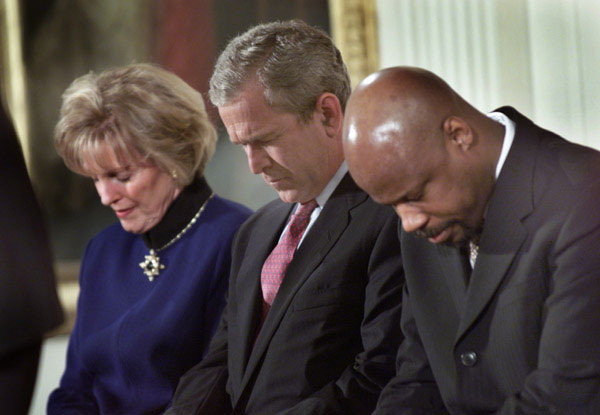When it comes time to decide who gets millions of dollars in grants, the head of the federal juvenile justice agency doesn’t let the opinions of his experts get in the way.
In awarding competitive grants for mentoring, research and delinquency prevention last year, J. Robert Flores passed over dozens of high-scoring bids in order to fund lower-scoring proposals –even though federally appointed experts had ranked some of those proposals 37th, 49th and 84th, according to recently obtained documents.
Those documents show that it is not unusual for the U.S. Department of Juvenile Justice and Delinquency Prevention (OJJDP), which Flores heads, to pick lower-scoring bids in competitive grants – a practice that sparked a recent congressional investigation after reports about the practice in one grant program.
|
|
| Dreaming: The Rev. Wintley Phipps, founder of the U.S. Dream Academy, prays with Shirley Dobson, chairwoman of the National Day of Prayer, and President Bush. |
The picture emerging from several hundred pages of OJJDP documents, as well as interviews with current and former Justice Department staffers, is of Flores steering some of the agency’s competitive grants toward his preferences, even when they conflicted with the opinions of the agency’s career staff and outside experts. Flores favors faithbased and child abuse prevention programs, and has told colleagues that the high scores of many proposals reflect not so much the quality of the programs as the quality of the grant-writers at large organizations.
Critics say Flores’ grant making process betrays a bias that neglects important juvenile justice projects and violates the competitive grants process. Organizations spend precious manpower (and therefore money)applying for grants, and many believe that the process at OJJDP has been a charade that wastes their resources, because Flores was going to fund primarily whoever he wanted.
Federal regulations give agency administrators discretion in awarding competitive grants, and officials throughout the government use that discretion to fund their priorities, which sometimes don’t jibe with the scores of grant review panels.
The question for the juvenile justice field, and for the House Committee on Oversight and Government Reform, is whether Flores abused that discretion. Flores has declined several requests to discuss the grants with Youth Today.
Winners
While previous reports about OJJDP’s grant making have focused on the 2007 National Juvenile Justice Programs grants, the latest documents cover several other competitive funding streams, including Mentoring, Prevention and Intervention, Field-Initiated Research and Evaluation, and Substance Abuse.
There is no obvious pattern. Several faith-based organizations are among those plucked from lower in the ranks to receive grants, but other faith-based groups were bypassed. As for looking beyond large organizations with good grant-writers, several of the lowest-scoring winners are large, national organizations that routinely get federal funding.
The selection process for these grants appears to differ somewhat from the National Programs grants: The choices of winners do not deviate as drastically from the scores given by the teams that reviewed the bids, and those teams appear to have been composed of outside experts rather than staffers. For two grants programs, the winners closely reflect the scores of the review panels.
Following are some of the results for specific grants, with selected winners listed by rank and score.
|
Click here to see OJJDP’s grant score spreadsheets. |
Grant: Mentoring
Bids ranked: 237
Winners: Six of the nine grants went to bids ranking in the top 19, including the two top-scoring proposals (Virginia Mentoring Partnership, in Richmond, and Partnership for a Healthy Scott County, in Mississippi). The other three grants went to these organizations:
* 42. People for People, Philadelphia. Score: 87.7. $666,667. People for People describes itself as "the community outreach arm of Greater Exodus Baptist Church." It has a mentoring program.
* 43. Plumas Rural Services, Quincy, Calif. Score: 87.3. $693,589. Plumas focuses on child care, family support and food services.
* 84. Harrisburg Institute at Messiah College, in Harrisburg, Pa. Score: 81. $630,000. Messiah is a Christian-based college, and the institute focuses on students providing community service. A news release from the college said the grant will be used "to further develop strategies and programs for mentoring academically at-risk youth in the City of Harrisburg."
Among those bypassed: Bolder Options (third), Communities in Schools Dallas (seventh) and several Big Brothers Big Sisters organizations, including ones that ranked fourth, eighth and 16th.
Grant: Field-Initiated Research and Evaluation
Bids ranked: 78
Winners: Five of the eight grants went to bids that ranked first (University of Southern California), seventh, 10th, 13th and 18th. The award amounts below are for what the applicants requested.
The other winners were:
* 29. North Carolina State University, Department of 4-H Youth Development and Family & Consumer Sciences, Raleigh. Score: 83. $992,243. The records state that the grant is for a "fathers count study."
* 38. ICF Inc., Fairfax, Va. Score: 78. $1.48 million for "a randomized controlled trial study of Amachi Texas." ICF is an international consultant that works extensively with federal agencies. Amachi is a faith-based mentoring program that focuses on children whose parents are in jail or prison.
* 47. Prevent Child Abuse America, Chicago. Score: 73. $1.5 million for a project called "Tribal youth victimization and juvenile delinquency: Understanding the connection to prevent the cycle."
Among those bypassed: Vera Institute of Justice (second), National Council on Crime and Delinquency (14th and tied for 38th), the National Council of Juvenile and Family Court Judges (17th and 35th) and numerous colleges and universities.
Grant: Prevention and Intervention
Bids ranked: 202
Winners: Eleven of the 13 winners ranked in the top 24, including the top-scoring bid (Friends for Youth, Redwood City, Calif.). The last two grantees were:
* 30. Bethesda Family Services Foundation, Lewisburg, Pa. Score: 88.9. $500,000. The organization provides counseling to adjudicated youth and those at risk of court involvement. It has won federal grants before, and OJJDP has funded replication of its model in other states.
* 39. U.S. Dream Academy, Columbia, Md. Score: 87. $740,000. A long-time winner of federal earmarks through several departments, the Dream Academy is an after-school program started by the Rev. Wintley Phipps, a successful gospel singer with close ties to elected officials of both major parties. It operates in several states. (See "How a Song and a Prayer Opened Washington’s Wallet," September 2001.
Among those bypassed: Vista Community Clinic (second), United Teen Equality Center (third), Asian Community Mental Health Board (fourth)and Youth Network Council (fifth).
Grants: Substance Abuse, and Re-entry and Family Strengthening. For these two grant programs, the agency did not veer as far from the rankings as in the grants summarized above. The nine Substance Abuse grants went to bids that ranked from second through 15th, out of 159 applications, according to the documents. Seventeen of the 19 Re-entry winners ranked among the top 25, including the top four. Two were ranked 31st and 36th, out of 107 ranked applicants.
































